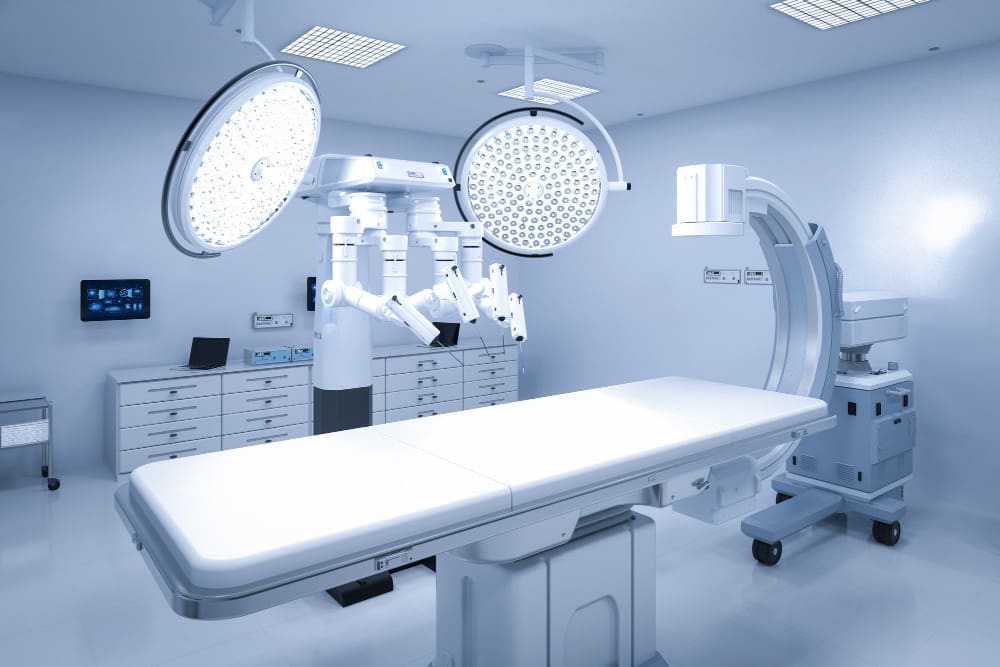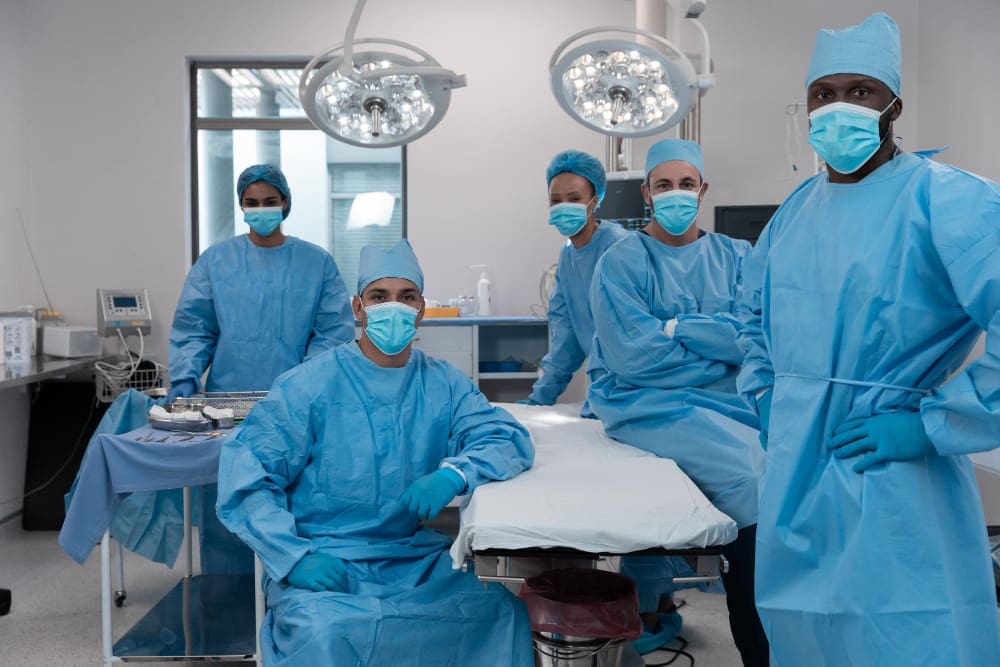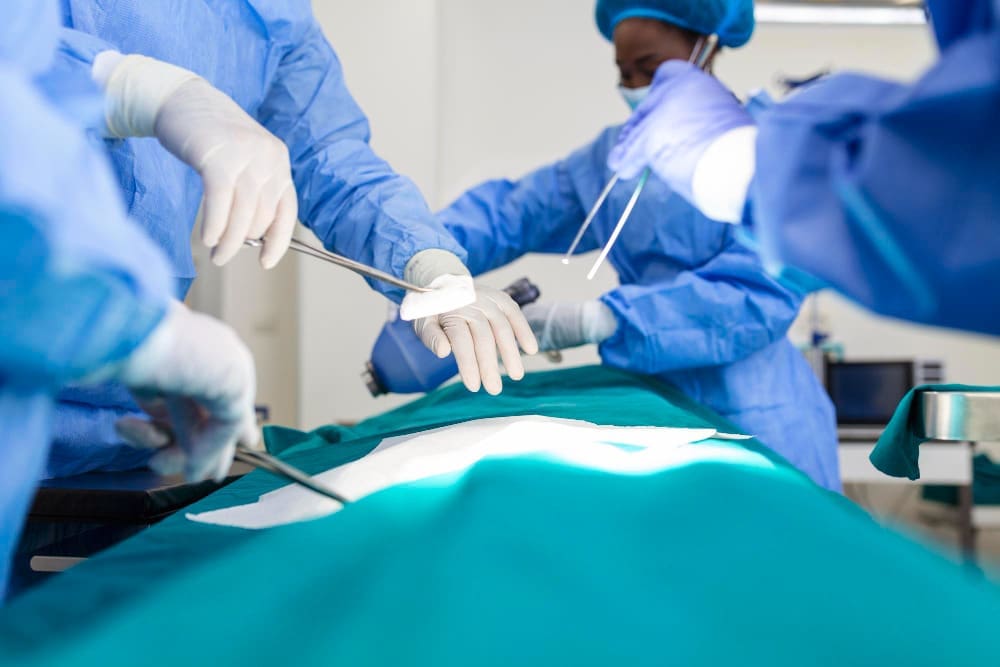
At Liv Hospital, we’re leading the way in surgical care with robotic surgery. This method uses advanced robotics and computer tech for complex procedures. It’s done through small incisions.
Going under the knife can be scary. That’s why we use robotic-assisted surgery. It offers the latest, least invasive treatments. This means less time recovering, less scarring, and fewer complications.
Our team is all about personalized care. We make sure each patient gets a treatment plan just for them. By combining top-notch robotic systems with a team effort, we achieve amazing results.
Key Takeaways
- Robotic surgery is a minimally invasive method using advanced robotics and computer technology.
- It results in less trauma to the patient, reducing recovery time and scarring.
- Our institution provides personalized care with treatment plans tailored to individual needs.
- A multidisciplinary approach is used to deliver world-class outcomes.
- Robotic-assisted surgery minimizes complications and enhances patient care.
Understanding Robotic Surgery: A Comprehensive Definition

Robotic surgery is changing how we do surgery, making it more precise and less invasive. It lets surgeons control robotic arms and tools from a console. This gives them better control and stability during operations.
The Evolution of Surgical Techniques
Surgical techniques have improved a lot over time, with robotic surgery leading the way. Robotic systems help us do complex surgeries with more precision and accuracy.
Core Components of Robotic Surgical Systems
The main parts of robotic surgical systems are:
- The surgeon’s console, which gives a detailed view of the surgery
- Robotic arms, with tools that move like the surgeon’s hands
- High-definition systems, showing a clear view of the surgery area
Knowing how robotic surgery works helps patients choose the right treatment. Our team is always learning about new tech to give the best care.
How Does Robotic Surgery Work?

Robotic surgery is a big step forward in medical tech. It lets surgeons do complex tasks with better precision and control. We use top-notch robotic systems to give our patients the best care.
The Surgeon’s Console
The surgeon’s console is the heart of the robotic surgery setup. Here, the surgeon controls the robotic arms and tools with great precision. The console offers an immersive 3D view of the surgery area, making dissection and suturing accurate.
Robotic Arms and Instruments
The robotic arms are made to move like a human hand but better. They have special tools that can be swapped out during surgery. This makes the procedure flexible and versatile.
Visualization and Imaging Systems
Advanced imaging systems give a clear, enlarged view of the surgery area. The high-definition 3D view lets surgeons see more than in traditional surgery.
Real-Time Motion Translation
Real-time motion translation lets the robotic system mirror the surgeon’s hand movements. This ensures a smooth, precise surgery. It allows for precise and accurate movements, lowering the chance of complications and improving results.
Robotic surgery combines these advanced technologies for a minimally invasive, effective approach to complex surgeries. We’re dedicated to giving our patients the best care with the latest in robotic surgery.
Define Robotic Surgery: Key Characteristics and Principles
Robotic surgery is a new way to do operations. It uses advanced technology and the skills of surgeons. This method has changed how surgeries are done, helping both patients and doctors.
Minimally Invasive Approach
Robotic surgery is known for being minimally invasive. It uses small cuts to insert robotic tools for surgery. This approach causes less damage, less blood loss, and faster healing for patients.
Computer-Enhanced Control
Robotic surgery systems give surgeons better control over their tools. This technology helps with precise and detailed work. The surgeon’s actions are translated into exact movements by the robotic tools, making complex surgeries easier.
Surgeon’s Role in Robotic Procedures
Even with the latest tech, the surgeon is key in robotic surgery. The robotic system helps the surgeon’s skills, allowing for more precise work. Our surgeons are well-trained in using these systems, ensuring top care for patients.
Robotic surgery leads to fewer complications, less blood loss, and less pain. It also means shorter hospital stays and smaller scars. Our team, including nurses with special training in oncology, works together to give full care.
| Key Characteristics | Benefits |
|---|---|
| Minimally Invasive Approach | Less tissue trauma, reduced blood loss, quicker recovery |
| Computer-Enhanced Control | Greater precision, enhanced dexterity |
| Surgeon’s Expertise | High precision, control, and better outcomes |
“Robotic surgery has revolutionized the field of surgery, making it safer and less invasive with faster recovery times.”
The Da Vinci Surgical System and Other Robotic Platforms
Medical robotic surgery, like the Da Vinci Surgical System, is growing fast worldwide. This growth comes from its advanced features and better patient results.
Da Vinci System Components and Capabilities
The Da Vinci Surgical System is a top robotic surgery tool. It has a surgeon’s console, robotic arms for the patient, and a 3D vision system. It offers better control, precision, and less invasive surgery. This makes it great for many surgeries, like urology and gynecology.
Alternative Robotic Surgery Systems
Other robotic surgery systems are also coming up. Companies like Medtronic and Stryker are making their own systems. Each has special features and uses. This competition could lead to more innovation and make robotic surgery more common.
Technological Advancements in Surgical Robotics
Surgical robotics is getting better fast, thanks to new tech. We’re seeing better vision systems, more precise tools, and AI being used. These changes will make robotic surgery even more precise and effective.
| Robotic Surgery System | Key Features | Applications |
|---|---|---|
| Da Vinci Surgical System | High-definition 3D vision, enhanced dexterity | Urology, gynecology, general surgery |
| Medtronic Robotic System | Advanced visualization, robotic arms | General surgery, thoracic surgery |
| Stryker Robotic System | Precision instrumentation, 3D imaging | Orthopedic surgery, neurosurgery |
As we keep improving medical robotic surgery, we promise to give our patients the best treatments. We’re always looking for the latest and most effective ways to help our patients.
Benefits of Robotic-Assisted Surgery for Patients
Patients get many benefits from robotic-assisted surgery. These include less pain and better-looking results. Our teams work together to give patients the best care.
Reduced Pain and Blood Loss
Robotic surgery is less invasive. This means less tissue damage and trauma. It leads to less pain and blood loss after surgery.
“The precision of robotic surgery allows for more delicate procedures, minimizing the impact on surrounding tissues,” says –Dr. a leading robotic surgeon.
Shorter Hospital Stays and Recovery Time
Patients usually stay in the hospital for less time. They also recover faster. This is because the surgery is less traumatic.
Improved Cosmetic Results
The precision of robotic surgery leads to smaller incisions. This results in better-looking results. It’s great for surgeries in visible areas.
Lower Risk of Complications
The technology used in robotic surgery lowers the risk of complications. It makes surgery safer. Our surgeons use the latest technology to ensure the best results.
We aim to give our patients the best care. Robotic surgery offers many benefits. These include fewer complications, less blood loss, reduced pain, shorter stays, and smaller scars. It’s a great option for those seeking advanced medical treatments.
Common Types of Robotic Surgery Procedures
Robotic surgery has changed many medical fields, making treatments more precise and less invasive. At our institution, we use this technology to give our patients the best care. We cover a wide range of surgical areas.
Urological Applications
In urology, robotic surgery shines. It’s used for surgeries like prostate and kidney removals. This method helps keep more of the surrounding tissues and nerves intact. This could lead to better results for patients.
Gynecological Procedures
In gynecology, robotic surgery is a big help. It’s used for surgeries like hysterectomies and treating endometriosis. The robotic system’s better view and control let surgeons do complex tasks more easily and accurately. Our team is skilled in robotic gynecologic surgeries, ready to tackle many conditions.
General Surgery Applications
Robotic surgery is also used in general surgery. It’s used for surgeries like gallbladder removals and hernia fixes. This technology could mean shorter recovery times and less pain after surgery. It makes the patient’s experience better.
Cardiac and Thoracic Uses
Cardiac and thoracic surgeries also benefit from robotic systems. These tools help surgeons do delicate work more accurately. This could lead to better results for patients with complex heart and lung surgeries.
We offer a wide range of robotic surgeries to meet each patient’s needs. We make sure they get the right and most effective treatment.
Robotic Surgery Equipment and Instrumentation
The success of robotic surgery comes from its advanced tools and equipment. We use top-notch robotic surgery gear. This includes special surgical tools and end effectors made for the robotic system.
Specialized Surgical Tools and End Effectors
Our systems have surgical robotic arms for precise control and flexibility. The robotic instrumentation is made to mimic human hands. This allows for detailed work in complex surgeries.
Camera Systems and 3D Visualization
High-definition cameras give a clear view of the surgery area. 3D visualization helps the surgeon navigate complex anatomy. This is key for successful robotic surgeries.
Maintenance and Sterilization Requirements
We follow strict maintenance and sterilization rules. This ensures our robotic surgery equipment is always in top shape. Proper care is vital for patient safety and infection prevention.
Comparing Traditional, Laparoscopic, and Robotic Approaches
It’s important to know the differences between traditional, laparoscopic, and robotic surgery. At our institution, we offer all three. This lets our surgeons choose the best method for each patient.
The choice depends on the patient’s condition, the surgeon’s skills, and the procedure’s needs. Open surgery is sometimes needed for complex cases. It has bigger incisions and longer recovery times. On the other hand, laparoscopic surgery is less invasive but has its own limitations.
Open Surgery vs. Robotic Surgery
Robotic surgery combines the benefits of minimally invasive surgery with better dexterity and vision. It’s a good option for many procedures. Studies show it can lead to less blood loss and shorter hospital stays than open surgery.
A study on SpringerLink points out the benefits of robotic surgery in complex cases.
Laparoscopic vs. Robotic Techniques
Robotic surgery offers better precision and a three-dimensional view. This helps surgeons with complex tasks. But laparoscopic surgery is also valuable for simpler procedures.
When Each Approach Is Most Appropriate
Our surgeons are skilled in all three methods. They work with patients to find the best treatment plan. The choice is based on the patient’s needs, the procedure’s nature, and the benefits of each method.
The Surgeon’s Experience: Training and Adaptation
Robotic surgery is a big step forward in surgery, needing surgeons to get rigorous training. We make sure our surgeons are well-trained in using robotic systems. This ensures they can do their job well.
Learning Curve and Certification Process
Learning robotic surgery takes time, but with the right training, surgeons get very good at it. Our surgeons go through a certification process. It includes both learning the theory and practicing the skills needed for complex surgeries.
Surgeon Control and Autonomy
Robotic systems give surgeons a lot of control and autonomy. This lets them make precise decisions during surgery. It helps them do very delicate operations with great accuracy.
Team Dynamics in Robotic Surgery
Good team dynamics are key in robotic surgery. The team works together to make sure the surgery goes well. We focus on teamwork and clear communication to get the best results.
Limitations and Challenges of Robotic Surgery
Robotic surgery has changed the medical world, but it’s not perfect. We must face its challenges as we improve it.
Technical Limitations and Possible Complications
Robotic surgery, like any surgery, can have problems. We’re always trying to make it safer. We do this through better training and new technology.
Accessibility and Healthcare Disparities
We want to make robotic surgery available to everyone. But, not everyone has the same access to it. This is a big problem.
We’re working hard to make robotic surgery more available and affordable. We also want to reduce the risks involved.
Conclusion: The Transformative Impact of Robotic Surgery
Robotic surgery is changing the game in surgery. It brings patients the benefits of less invasive procedures. It also improves surgical precision and results. At our institution, we’re all about using the latest in robotic surgery. We want to make sure our patients get the best treatments out there.
The future of robotic surgery looks bright. New tech will make it even better and help more people. We’re excited to keep improving and giving our patients the best care.
We’re all about using the latest tech with a caring touch. This lets us offer top-notch healthcare to patients from around the world. The robotic surgery impact is huge. We’re eager to see what more we can do in surgical care.
FAQ
What is robotic surgery?
Robotic surgery is a new way to do surgery. It uses robots to make small cuts and do complex tasks. This means less pain and quicker healing for patients.
How does robotic surgery work?
In robotic surgery, a surgeon controls robotic arms from a console. The arms have tools that help with the surgery. The surgeon sees everything clearly on a screen, making the surgery precise.
What are the benefits of robotic-assisted surgery?
Robotic surgery has many benefits. It causes less pain and bleeding. Patients stay in the hospital less time and heal faster. It also looks better and is safer.
What types of procedures can be performed using robotic surgery?
Robotic surgery is used in many areas. This includes urology, gynecology, and general surgery. It’s used for things like prostate surgeries and hysterectomies.
What is the da Vinci Surgical System?
The da Vinci Surgical System is a top robotic system. It helps surgeons be more precise and get better results. It has clear views and precise tools.
How is robotic surgery equipment maintained and sterilized?
Keeping robotic equipment clean is very important. We follow strict rules to keep it safe for patients. This helps prevent infections.
What is the difference between robotic surgery and traditional or laparoscopic surgery?
Robotic surgery is more precise and less invasive. It’s better for many procedures. Traditional surgery has bigger cuts and longer recovery. Laparoscopic surgery has limits due to tool control.
What training do surgeons need to perform robotic surgery?
Surgeons get special training for robotic surgery. It takes time to learn, but with practice, they get very good.
Are there any limitations or challenges associated with robotic surgery?
Robotic surgery has some downsides. It’s expensive and has technical limits. There are also access issues in some places.
Is robotic surgery available everywhere?
Not all places have robotic surgery. It depends on the area and hospitals. We’re working to make it more available.
References
MedlinePlus. Robotic surgery. https://medlineplus.gov/ency/article/007339.htm
PMC. Robotic Surgery: A Comprehensive Review of the Literature and Current Trends. https://pmc.ncbi.nlm.nih.gov/articles/PMC10445506/








